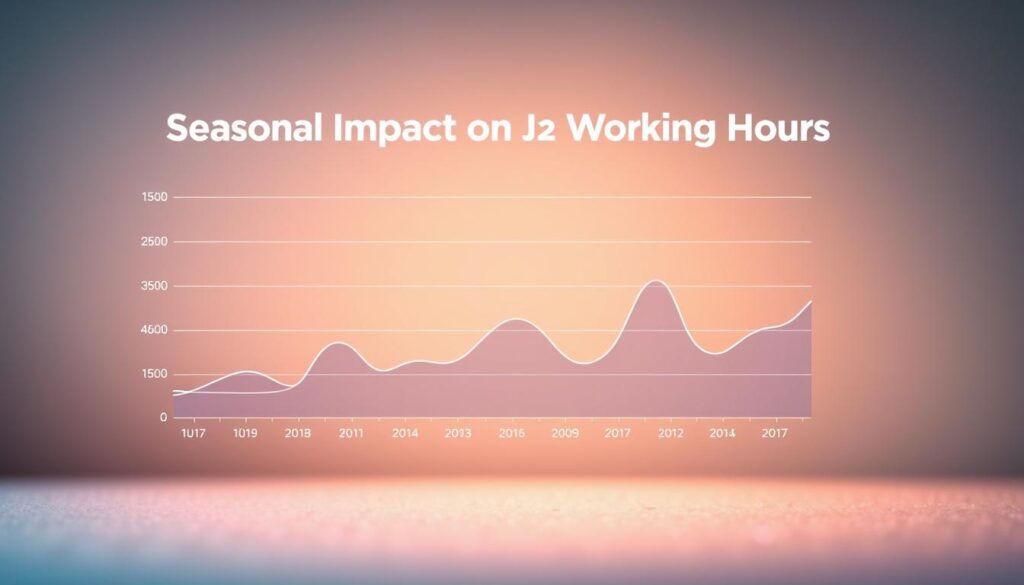Affiliate Disclosure
HVAC Guide Guys is a participant in the Amazon Services LLC Associates Program, an affiliate advertising program designed to provide a means for sites to earn advertising fees by advertising and linking to Amazon.
How Many Hours a Week Do HVAC Work? Ever wondered how many hours HVAC professionals really work behind the scenes? The world of heating, ventilation, and air conditioning is far more dynamic than most people realize.
HVAC work schedules are not your typical 9-to-5 routine. Technicians navigate a complex landscape of standard hours, seasonal demands, and unexpected service calls. These can dramatically reshape their weekly commitments.
Understanding the HVAC work schedule requires diving deep into an industry where flexibility isn’t just an option—it’s a requirement. From residential installations to commercial maintenance, the hours can fluctuate significantly based on multiple factors.

This guide will unpack the intricacies of how many hours a week HVAC professionals truly work. It will provide insights that go beyond surface-level expectations.
Key Takeaways
- HVAC technicians typically work 40 hours per week
- Seasonal demands can significantly impact work hours
- Emergency services may require additional on-call time
- Work schedules vary between residential and commercial sectors
- Geographic location plays a critical role in HVAC work patterns
Table of Contents
Understanding HVAC Work Schedules: The Basics
HVAC technician work hours are as dynamic as the industry itself. Your typical hvac workweek might look different from other professions. Schedules adapt to seasonal demands and client needs. Most HVAC technicians work a standard 40-hour week, but the job can be more flexible.
Understanding HVAC scheduling requires insight into this unique profession. Your work can be divided into several key categories:
- Routine maintenance and installations
- Emergency repair services
- Seasonal peak demand work
- Preventative system checkups
The scheduling complexity in HVAC work stems from multiple factors. Seasonal variations play a big role in determining work hours. During summer and winter peaks, you might work extended hours to meet demand for cooling and heating system services.
Flexibility is the hallmark of a successful HVAC technician’s schedule.
Your work hours can include standard daytime shifts, evening calls, and weekend emergency services. Some technicians develop specialized schedules for residential or commercial clients. About 40% of HVAC technicians report working overtime, mainly during intense seasonal periods.
Advanced scheduling software and strategic planning help HVAC companies optimize technician work hours. This ensures efficient service delivery while maintaining a balanced workload for technicians like yourself.
Explore Our HVAC Shop
Looking for top-rated HVAC tools, parts, and accessories? Visit our shop and find the perfect solution for your needs.
Visit the ShopStandard Weekly Hours in HVAC Industry
The HVAC industry offers a flexible work schedule that changes a lot throughout the year. Knowing the standard work hours helps you handle the unique needs of this important job.
HVAC workers usually work a mix of regular and flexible hours. They often work a standard 40-hour week. But, the hours can change a lot with the seasons.
Regular Business Hours Schedule
Most HVAC technicians work a set schedule:
- Monday to Friday work schedule
- Standard 8-hour shifts
- Typical working hours: 8:00 AM to 5:00 PM
- Some companies offer 4-day, 10-hour work weeks
Overtime Considerations
Overtime is a big part of HVAC work, more so during busy times. Technicians can expect:
- 4-12 additional hours per week during peak seasons
- Potential for 50-70 hours during summer and winter months
- Emergency repair calls outside standard hours
- Increased compensation for extended work periods
Seasonal Hour Variations
Your work hours will change a lot with the seasons:
- Summer Peak (May-September): Up to 70 hours per week
- Winter Season: 50-60 hours per week
- Spring/Fall: Reduced hours around 30-40 per week
Knowing these patterns helps you plan your work and personal life better in the HVAC industry.
Different HVAC Career Paths and Their Hours
The HVAC industry has many career paths with different work hours. Knowing these paths can help you find the right job for your goals and lifestyle.
HVAC jobs have various schedules based on the role. Let’s look at the different careers and their typical hours:
- Counter Sales: Follows standard retail hours
- Consistent 40-hour workweek
- Predictable schedule
- Limited after-hours work
- Field Sales: Offers flexible hours
- 40-45 hour standard week
- Client meetings outside regular hours
- Travel-intensive role
- Service Technicians: Has the most variable hours
- Emergency call rotations
- Extended hours during peak seasons
- Potential on-call responsibilities
- HVAC Installers: Work schedules based on projects
- Aligned with construction project timelines
- Early start times
- More predictable end times
Your pay and hours can change a lot. New technicians start at $22.47 an hour, while experienced ones can make up to $32.83. The average salary for an HVAC technician is about $50,590 a year.
When picking your HVAC career, think about your work-life balance, overtime, and seasonal changes. Each job has its own challenges and chances in this fast-paced field.
Explore Our HVAC Shop
Looking for top-rated HVAC tools, parts, and accessories? Visit our shop and find the perfect solution for your needs.
Visit the ShopHow Many Hours a Week Do HVAC Work: Complete Breakdown
HVAC work hours are unpredictable. Your schedule changes with the season, customer needs, and emergencies. Knowing these changes helps you plan better.
During peak seasons, HVAC contractors work much more. Here’s what you might see:
Peak Season Working Hours
In summer and winter, your work hours go up a lot. You might see:
- 50-70 hours per week during extreme weather
- Potential weekend work
- Extended daily shifts to meet high demand
Off-Season Schedule Patterns
When it’s not as hot or cold, your work hours go down. Expect:
- 30-40 hours per week during mild seasons
- More flexible scheduling
- Opportunities for training and equipment maintenance
Emergency Call Requirements
HVAC pros must be ready for unexpected calls. 24/7 availability might mean:
- On-call rotations
- Potential nighttime or holiday emergency repairs
- Additional compensation for after-hours services
The U.S. Bureau of Labor Statistics says the HVAC industry will grow 4% by 2029. This means more work chances in different schedules.
Residential vs Commercial HVAC Work Hours
Exploring HVAC careers means knowing the differences in work schedules. Your hours can change a lot, depending on whether you work residential or commercial.
Residential HVAC techs often have more flexible hours. They might start work around 7 AM to fit homeowner schedules. In busy seasons, they could work 60 to 80 hours a week. They might also have to work on call, even outside regular hours.
- Residential HVAC installation hours often range from 40-60 hours weekly
- Seasonal variations dramatically impact workload
- Emergency services may require on-call availability
Commercial HVAC work has a different schedule. Hours might be more set, but can include night and weekend shifts. This helps avoid disrupting business. Commercial techs work 40-50 hours in slow seasons, but up to 65+ hours in summer.
Key differences in hvac installation hours include:
- Residential projects: Often completed in 1-2 days
- Commercial projects: Can extend over weeks or months
- Scheduling complexity increases with project size
Choosing your career path affects your work-life balance. Residential roles offer variety, while commercial jobs have more set schedules. Knowing these differences helps you decide on your HVAC career path.
Explore Our HVAC Shop
Looking for top-rated HVAC tools, parts, and accessories? Visit our shop and find the perfect solution for your needs.
Visit the ShopSeasonal Impact on HVAC Working Hours
Your HVAC job hours change a lot throughout the year. This creates a unique work rhythm that can be tough, even for experienced techs. Knowing these seasonal patterns helps you get ready for busy times and quiet periods.

HVAC weekly hours can change a lot with the seasons. Let’s look at how these changes affect your work and schedule:
Summer Peak Demands
In summer, your HVAC job hours can really go up. As it gets hotter, so do the service calls. You might work 50-80 hours a week as air conditioning becomes key for comfort.
- Peak service periods start around Memorial Day
- Most intense workload from June through August
- Emergency repairs and installations become frequent
Winter Schedule Adjustments
Winter brings its own set of challenges for HVAC pros. While not as busy as summer, heating system emergencies can push your hours to 50-60.
- Furnace inquiries increase after first snowfall
- Service calls spike after January 1st
- On-call rotations become more common
Shoulder Season Workload
Spring and fall offer a break from the busy summer and winter. In these shoulder seasons, your HVAC hours usually go down to 30-40.
| Season | Typical Weekly Hours | Primary Focus |
|---|---|---|
| Summer | 50-80 hours | AC Repairs/Installations |
| Winter | 50-60 hours | Heating System Services |
| Spring/Fall | 30-40 hours | Maintenance and Tune-ups |
Contractors often use these slower times for training, maintenance, and tune-ups. The best time for tune-ups is in March and April. It gets systems ready for the summer rush.
On-Call Responsibilities and Emergency Service Hours
As an HVAC pro, your work hours go way beyond regular business times. Emergency calls can mess up your personal life, needing you to be ready 24/7.
Emergency HVAC work needs special flexibility. Your hours might include:
- Immediate response to critical system failures
- Being available on weekends and holidays
- On-call rotation schedules
- Quick action during extreme weather
Customers count on HVAC techs when systems fail. A study shows 86% of customers see good service as a reason to stick with a brand. Your on-call duties play a big role in this.
Emergency service usually means:
- Quickly figuring out system problems
- Fast diagnostic checks
- Fixing issues right away or finding temporary fixes
- Scheduling follow-up maintenance
Though tough, these duties can pay well. HVAC pros who do great in emergencies can boost their careers and pay.
Being ready and acting fast is key to good HVAC emergency response.
Explore Our HVAC Shop
Looking for top-rated HVAC tools, parts, and accessories? Visit our shop and find the perfect solution for your needs.
Visit the ShopGeographic Location’s Effect on Work Schedule

Your HVAC work schedule can change a lot based on where you live and work. The place you are in greatly affects your work hours and job tasks.
Different places have their own challenges and chances for HVAC workers. Knowing these differences can help you plan your career better and manage your work hours well.
Regional Weather Patterns and Their Impact
Weather patterns in your area can greatly affect your work. Here are some examples:
- Southern states get very hot in summer, making air conditioning services very busy
- In the north, winter brings more work for heating systems
- Coastal areas face extra challenges from humidity and hurricanes
Market Demand Variations
Your earnings and work hours can change a lot based on local demand. Cities usually have more steady work, while rural areas have more seasonal work.
“Location is everything in the HVAC industry” – HVAC Industry Professional
Salary data shows big differences based on location:
- San Francisco has the highest starting salary for HVAC techs at $62,000 a year
- New York City starts at $58,500
- Mississippi and West Virginia have the lowest salaries, around $48,100
Understanding local market demands can greatly affect your work schedule and earnings. Study local trends, connect with local pros, and stay flexible to boost your career.
Work-Life Balance in HVAC Careers
Working in HVAC careers can be tough when it comes to balancing work and life. HVAC contractor hours often go way over the usual 40 hours a week, during busy times. It’s important to know this to keep your personal life and job happy.
Good HVAC workers find ways to handle their busy schedules:
- They talk to their bosses about when they’re available
- They make plans for when things slow down
- They make time for themselves and their mental health
- They plan vacations when it’s not busy
The unpredictable nature of HVAC work can hurt personal relationships. Technicians might work up to 60 hours in busy times. This means they need to plan carefully and talk to their family about it.
| Work Type | Average Hours | Work-Life Balance Impact |
|---|---|---|
| Service Technicians | 50-60 hours/week | High stress, irregular schedules |
| Installation Technicians | 40-45 hours/week | More predictable hours |
Tip: Learning to manage your time and stay flexible can really help your work-life balance in HVAC.
Even though it’s tough, many HVAC workers find it very rewarding. The secret is finding a balance that lets you do well at work without losing your personal life.
Overtime and Additional Hours Opportunities
In the HVAC industry, you can earn more than just your regular hours. Overtime can really increase your income. Technicians usually get 1.5 times their regular pay for extra hours. Planning your work hours wisely can lead to big financial gains.
Emergency calls can also pay more. If you fix heating or cooling problems outside regular hours, you get extra pay. This includes nights, weekends, and holidays, which can boost your earnings a lot during busy times.
Extended project deadlines can also mean more money. Big HVAC jobs often need extra hours to finish on time. If you’re flexible, you might get paid more for these long projects.
It’s important to know the rules about overtime. The Fair Labor Standards Act says you should get 1.5 times your regular pay for over 40 hours a week. Keeping track of your hours and knowing your rights helps you get fair pay for your work.

